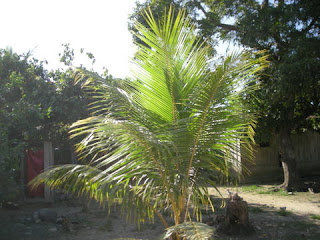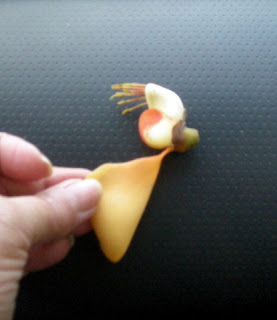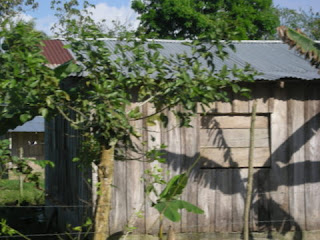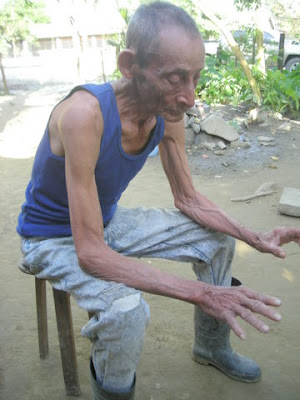 Don Pedro said he knew just the person we needed to talk to to find out more about the history of Tripoli. He showed us to Don Jesús' house to ask him if he would talk with us. He came out of his modest house (photo) perhaps a little suspicious, but very curious as Tripoli doesn't get a lot of visitors, especially foreigners. A young woman (also in the photo) who might have been his granddaughter brought out some wooden stools and one chair, which was offered to me. I tried to give Don Jesús the chair, but he insisted that I take it. At last we had someone who was born and raised in the area!
Don Pedro said he knew just the person we needed to talk to to find out more about the history of Tripoli. He showed us to Don Jesús' house to ask him if he would talk with us. He came out of his modest house (photo) perhaps a little suspicious, but very curious as Tripoli doesn't get a lot of visitors, especially foreigners. A young woman (also in the photo) who might have been his granddaughter brought out some wooden stools and one chair, which was offered to me. I tried to give Don Jesús the chair, but he insisted that I take it. At last we had someone who was born and raised in the area!  We had an audience throughout our time with him. Several small children who were probably great-grandchildren wandered in and out. His granddaughter watched at the doorway and I could see another man inside who did not come out. One of Jesús' grown grandsons and family lived next door and he stood by the fence between the properties watching and listening. That might have been out of curiosity or maybe to watch over his grandfather in case these strangers had bad intentions. El Jefe waived him over and invited him join the conversation, in which he seemed very interested.
We had an audience throughout our time with him. Several small children who were probably great-grandchildren wandered in and out. His granddaughter watched at the doorway and I could see another man inside who did not come out. One of Jesús' grown grandsons and family lived next door and he stood by the fence between the properties watching and listening. That might have been out of curiosity or maybe to watch over his grandfather in case these strangers had bad intentions. El Jefe waived him over and invited him join the conversation, in which he seemed very interested. The following map shows all the places named in this article. Although the various pueblos look pretty close to each, getting from one to another (except Tierra Firme) requires going back to the highway and taking a different bumpy gravel road north. This makes for a long bus ride as the buses stop at every pueblo along the way.
The following map shows all the places named in this article. Although the various pueblos look pretty close to each, getting from one to another (except Tierra Firme) requires going back to the highway and taking a different bumpy gravel road north. This makes for a long bus ride as the buses stop at every pueblo along the way.Most of those roads are so small that they aren't even shown on this map. If you click to enlarge the map, you'll see that the area is divided by many rivers and creeks meandering north into the Caribbean Sea from the mountains in the south. For the most part, there are no bridges for traveling east or west, except on the main highway, which you can see follows along the base of the mountains. (Remind me to tell you about the shortcut that I tried to talk El Jefe into. ;-D )
 (Click map to enlarge for a better view)
(Click map to enlarge for a better view) Don Jesús has a severe hearing problem which he told us came from an incident in which he used dynamite to kill fish in the river (for easier catching) — a dangerous practice which unfortunately is still sometimes done in Honduras, along with poisoning the fish. My original plan was to do a video interview, but between El Jefe shouting and repeating questions and Don Jesús saying, "Eh? What did you say?", I abandoned that idea and just took notes instead.
Don Jesús has a severe hearing problem which he told us came from an incident in which he used dynamite to kill fish in the river (for easier catching) — a dangerous practice which unfortunately is still sometimes done in Honduras, along with poisoning the fish. My original plan was to do a video interview, but between El Jefe shouting and repeating questions and Don Jesús saying, "Eh? What did you say?", I abandoned that idea and just took notes instead. José de Jesús Medina was born in 1925, just up the road (which was only a path back then) in Tierra Firme. He even went inside to get his ID card to show us to make the interview official. He told us that the Tripoli area was partly underwater in the early days and only rice was grown. He said the whole area was fincas (farms) back then. Gradually, "the company" filled in the area and eventually a small creek was filled and the road was built during the term of President Suazo Cordova (1982-1986). He remembered when Tripoli only had four houses.
José de Jesús Medina was born in 1925, just up the road (which was only a path back then) in Tierra Firme. He even went inside to get his ID card to show us to make the interview official. He told us that the Tripoli area was partly underwater in the early days and only rice was grown. He said the whole area was fincas (farms) back then. Gradually, "the company" filled in the area and eventually a small creek was filled and the road was built during the term of President Suazo Cordova (1982-1986). He remembered when Tripoli only had four houses.  El Jefe asked if by 'company' he meant Standard Fruit (now Dole) and Jesús said yes, but I'm not entirely clear that he heard the question as he seemed a little confused. He also thought that "the company" had given Tripoli its name, but he didn't know why.
El Jefe asked if by 'company' he meant Standard Fruit (now Dole) and Jesús said yes, but I'm not entirely clear that he heard the question as he seemed a little confused. He also thought that "the company" had given Tripoli its name, but he didn't know why.Jesús proudly told us that it was he who donated the land for the school which was across the street from his home. A sign on the school indicated that it had been built by FHIS (a government agency) during the Maduro administration (2001-2005).  He said that the school even has a colegio (the upper high school grades), which many small town schools do not. He told us, however, that someone was trying to claim that he owned the land and was trying to take it away from the school. "That's not true!" he exclaimed. Hopefully, that doesn't happen.
He said that the school even has a colegio (the upper high school grades), which many small town schools do not. He told us, however, that someone was trying to claim that he owned the land and was trying to take it away from the school. "That's not true!" he exclaimed. Hopefully, that doesn't happen.
 He said that the school even has a colegio (the upper high school grades), which many small town schools do not. He told us, however, that someone was trying to claim that he owned the land and was trying to take it away from the school. "That's not true!" he exclaimed. Hopefully, that doesn't happen.
He said that the school even has a colegio (the upper high school grades), which many small town schools do not. He told us, however, that someone was trying to claim that he owned the land and was trying to take it away from the school. "That's not true!" he exclaimed. Hopefully, that doesn't happen.  We asked about where he went to school, but he matter-of-factly told us that there were no schools for children of that area in those days.
We asked about where he went to school, but he matter-of-factly told us that there were no schools for children of that area in those days.Don Jesús told us about entering the army when he was 17, and he remembered that he stayed exactly two years and nine months. El Jefe asked if he had joined the army or whether he had been snatched off the streets as was a common practice during much of Honduras' history. He laughed and said that no, he voluntarily joined. He said that President Tiburcio Carías (1933-49) treated the people like slaves and he was glad when he was ousted. He also told us that he was a Nacionalista, but we didn't get into politics any further than that.
 We said that Tripoli seemed to be a good place for children, with the school, health clinic, and the fútbol (soccer) fields, and asked about what kind of work was available for the young people of the area. Don Jesús told us that there was work for everyone, but only agricultural work.
We said that Tripoli seemed to be a good place for children, with the school, health clinic, and the fútbol (soccer) fields, and asked about what kind of work was available for the young people of the area. Don Jesús told us that there was work for everyone, but only agricultural work. El Jefe asked what kind of work Jesús had done. He answered in the present tense, saying "cleaning the potreros (fields) and palmeras (African palm plantations)", which means macheteing the fields to keep the weeds and tropical growth down and/or to prepare for new crops.
El Jefe asked what kind of work Jesús had done. He answered in the present tense, saying "cleaning the potreros (fields) and palmeras (African palm plantations)", which means macheteing the fields to keep the weeds and tropical growth down and/or to prepare for new crops. El Jefe was shocked and asked, "Still?!" Don Jesús hollered back, "Sí, Senor! Todos los días!" (Yes, sir! Every day!) Amazingly, this frail-appearing, 86-year-old man works six days per week cleaning fields with a machete! He said he works from about 5-7 a.m. to about 1 p.m. Sundays through Fridays, taking Saturday off to go to church. "I like to work! I enjoy it. I've worked since I was 12-years-old."
 When asked if he ever goes to La Ceiba, he said not much, but that he occasionally goes to La Unión where one of his sons lives. He liked that his son sometimes gives him money or clothes. His grandson made a joke that his last trip will be to La Masica because there is no cemetery in Tripoli and La Masica had the nearest one. (Cultural difference in humor!) This photo shows a flower from the trees that lined the road to Tripoli. El Jefe said that when he was a little boy, they used to play with them, pretending they were roosters.
When asked if he ever goes to La Ceiba, he said not much, but that he occasionally goes to La Unión where one of his sons lives. He liked that his son sometimes gives him money or clothes. His grandson made a joke that his last trip will be to La Masica because there is no cemetery in Tripoli and La Masica had the nearest one. (Cultural difference in humor!) This photo shows a flower from the trees that lined the road to Tripoli. El Jefe said that when he was a little boy, they used to play with them, pretending they were roosters. The duck and chicken photos in this article were all taken in or around Jesus' property. I was surprised to see the black duck. I see these bald-neck chickens (photo) all over the north coast and personally find them to be very unattractive. I've also seen many tail-less chickens and roosters. They must be selected for their egg laying or meat producing qualities because they sure are not as pretty as my chickens! On the other hand, I've been told that my bantams have no meat and they are lousy egg layers, too.
The duck and chicken photos in this article were all taken in or around Jesus' property. I was surprised to see the black duck. I see these bald-neck chickens (photo) all over the north coast and personally find them to be very unattractive. I've also seen many tail-less chickens and roosters. They must be selected for their egg laying or meat producing qualities because they sure are not as pretty as my chickens! On the other hand, I've been told that my bantams have no meat and they are lousy egg layers, too. Don Jesús mentioned that he plays three instruments, the mandolin, the accordion, and the violin. El Jefe asked if he could play something for us but he said that he only plays accompaniments with others. It could also be that he no longer has the instruments.
Don Jesús mentioned that he plays three instruments, the mandolin, the accordion, and the violin. El Jefe asked if he could play something for us but he said that he only plays accompaniments with others. It could also be that he no longer has the instruments. By this time, Don Pedro needed to leave to get home, so we all shook hands and said our goodbyes. It had been a pleasant and interesting time. As we were leaving, the grandson asked, "So who are you? Are you from La Prensa?" We laughed and said, no, but that I was a blogger and would write a story about Tripoli on the internet. "Oh," he seemed a little disappointed. ;-)
By this time, Don Pedro needed to leave to get home, so we all shook hands and said our goodbyes. It had been a pleasant and interesting time. As we were leaving, the grandson asked, "So who are you? Are you from La Prensa?" We laughed and said, no, but that I was a blogger and would write a story about Tripoli on the internet. "Oh," he seemed a little disappointed. ;-)We dropped Don Pedro off where he needed to go. The road back to the highway seemed to be 10 miles, not four, due to the bouncing around of the car in the ruts of the road. We may see the folks of Tripoli again sometime as there are some things that I want to check out further up the road.
 I hope that you enjoyed this little series with a view of the people and small town life on the north coast of Honduras. Credit goes to El Jefe, my collaborator, who helped me to remember some of the details and who showed (mostly) great patience with me yelling, "Wait! Wait!" to stop the car every few meters so I could take a photo. He really enjoyed it, too, so I'm sure we'll be doing this again.
I hope that you enjoyed this little series with a view of the people and small town life on the north coast of Honduras. Credit goes to El Jefe, my collaborator, who helped me to remember some of the details and who showed (mostly) great patience with me yelling, "Wait! Wait!" to stop the car every few meters so I could take a photo. He really enjoyed it, too, so I'm sure we'll be doing this again.Other articles related to the trip to Tripoli, Honduras:
La Gringa goes to Tripoli
Pedro Alberto Flores of Tripoli, Honduras
Elsa Gloria Ventura of Tripoli, Honduras
Final word on Tripoli (to be posted soon)
La Gringa goes to Tripoli
Pedro Alberto Flores of Tripoli, Honduras
Elsa Gloria Ventura of Tripoli, Honduras
Final word on Tripoli (to be posted soon)




 Welcome to my Blogicito —
Welcome to my Blogicito — 







